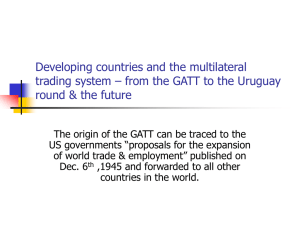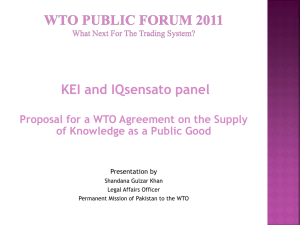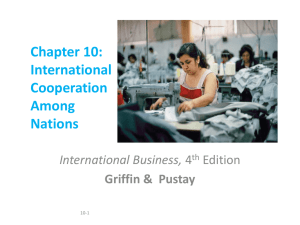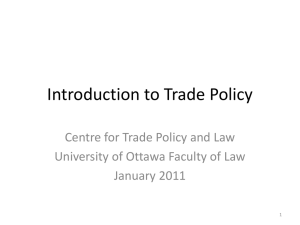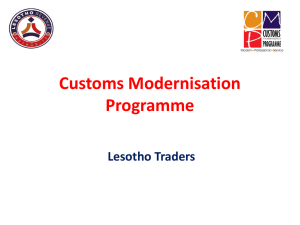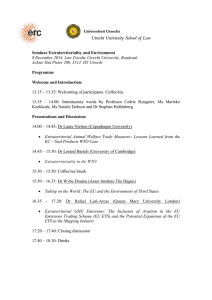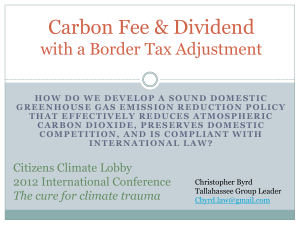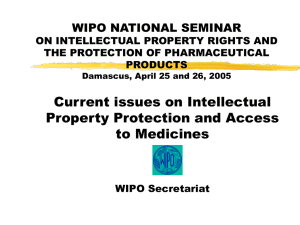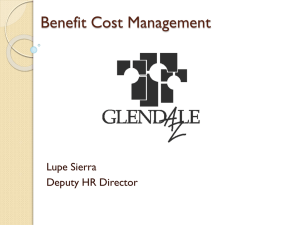WTO Trade Facilitation Agreement
advertisement
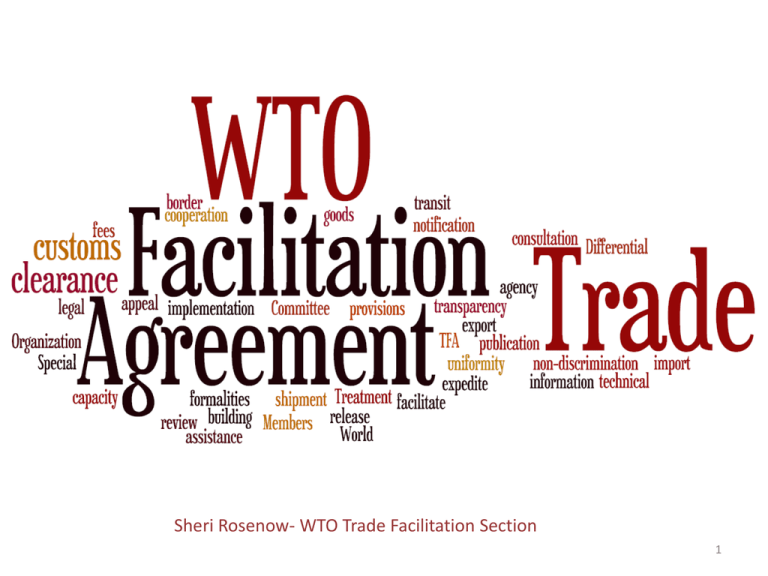
Sheri Rosenow- WTO Trade Facilitation Section 1 Today 1. Background 2. The Agreement 3. Special provisions for developing and leastdeveloped countries 4. Current work & way forward 5. WTO/WCO opportunities for cooperation 2 BACKGROUND 3 The International Organization that Governs the Rules of Trade Between Nations 4 Why TF at the WTO? Binding commitments from trading partners (160 Member countries) Enforcement through dispute settlement Apply to all border agencies 5 WTO Trade Facilitation TF negotiations began in 2004 Mandate in Annex D of Doha Work Program Part of Doha Round single undertaking Negotiating Group on TF 6 WTO Trade Facilitation Negotiations Why so long? Negotiations launched Negotiating Group established Preliminary Work Draft Legal Text v.1 Draft Legal Text v.18 Bali! 1996 July 2004 October 2004 December 2009 October 2013 December 2013 7 WTO Trade Facilitation Agreement Objectives: • Expedite movement, release & clearance of goods • Improve cooperation between customs/other authorities • Enhance technical assistance and build capacity 8 Existing WTO Legal Framework GATT Article X – Transparency • Publication • Administration of laws • Right to appeal GATT Article VIII – Fees and Formalities • Fees reflect cost of services rendered • Reduce # and kind of fees • Simplify formalities and documents • Minor penalty for minor errors GATT Article V – Freedom of Transit • Most convenient route • No discrimination • No unnecessary delays or restrictions • No duties 9 WTO Trade Facilitation Mandate Objectives: Scope: • Expedite movement, release & clearance of goods Transparency & Appeals • Improve cooperation between customs/other authorities • Enhance technical assistance and build capacity Import/Export Fees and Formalities Freedom of Transit Customs cooperation SDT 10 Technical Assistance Transparent Bottom up Member driven All Inclusive (open-ended meetings) 11 WORLD TRADE TN/TF/W/115/Rev.1 2 October 2007 ORGANIZATION (07-4172) Original: English Negotiating Group on Trade Facilitation COMMUNICATION FROM HONG KONG, CHINA, JAPAN, KOREA, MONGOLIA AND SWITZERLAND Revision The following communication, dated 1 October 2007, is being circulated at the request of the Delegations of Hong Kong, China, Japan, Korea, Mongolia and Switzerland. _______________ PROPOSAL ON PRIOR PUBLICATION AND CONSULTATION 1. The following textual proposal is submitted by Hong Kong, China, Japan, Korea, Mongolia, and Switzerland for consideration by the Negotiating Group. It is closely based on the proposals on prior publication and consultation made in the joint communication TN/TF/W/102 of 10 May 2006 and takes account of the discussion and other submissions on this issue in the Negotiating Group. 2. We acknowledge that some provisions require transitional implementation by developing-country Members because of their lack of capacity to meet the obligations. However, several core elements such as publication of trade-related law and regulations in accordance with Article X of GATT 1994 should be implemented by all the Members immediately upon the entry into force of the Trade Facilitation Agreement because of the basic nature of such provisions and the fact that the new agreement does not add any new obligations to the current system of GATT 1994. Similarly, we believe that national treatment, mostfavoured-nation treatment, general and security exceptions provided for in Articles I, III, XX, and XXI of GATT 1994 should apply to all the Members immediately even if those concepts are not stipulated in the new agreement. The following is an example of text which explicitly incorporates Articles XX and XXI of GATT 1994 into the new agreement: 12 Consolidated Text ARTICLE 10: FORMALITIES CONNECTED WITH IMPORTATION AND EXPORTATION 5. Single Window/One-time Submission 5.1 Members [[in so far as possible][where practicable]] [[shall][may]] [endeavour to] [maintain or] establish a "single window" where documentation and/or data requirements for exportation, importation and transit [procedures] are submitted [by a trader resident in the Member state in question] [[one time only][to a single entry point]] [to all stakeholders in international trade procedures]. [[The single window shall undertake onward distribution of the aforementioned documentation and/or data requirements to all the relevant authorities [[or agencies which require them][and participating agencies]].][A single window will be responsible for distribution of documents and information for all the bodies involved in international trade.]] [After the examination by the relevant authorities or agencies of the documentation and/or data, [[the single window shall notify the results to the applicants][the results shall be notified to the applicants through the single window]] in a timely manner.] 13 Sections I and III THE TRADE FACILITATION AGREEMENT 14 Trade Facilitation Agreement Section I: 12 articles of technical measures Section II: Special and Differential Treatment (SDT) Provisions for developing countries Section III: Institutional Arrangements and Final Provisions 15 Existing WTO Legal Framework GATT Article X – Transparency • Publication • Administration of laws • Right to appeal GATT Article VIII – Fees and Formalities • Fees reflect cost of services rendered • Reduce # and kind of fees • Simplify formalities and documents • Minor penalty for minor errors GATT Article V – Freedom of Transit • Most convenient route • No discrimination • No unnecessary delays or restrictions • No duties 16 TF Disciplines 17 TF Measures • • • • • • • • Transparency and Appeals Publication/internet publication Enquiry Point for trade information Opportunity to comment Consultations Advance rulings Right of appeal Transit Restrictions on fees and charges Use of guarantee • • • • • • • • • • • Import/Export/Transit Fees & Formalities Disciplines on fees Pre-arrival processing Risk management Post clearance audit Publish average release times Authorized operators Border agency cooperation Review formalities and documents Single window Eliminate use of PSI for tariff classification and customs valuation. Separate release from clearance 18 Benefits for Your Exporters Benefits for Government Transparency + Fairness •Predictability •Reduced time/costs •Better compliance •Better quality decisions Good Governance •Reduced costs •Reduced delays •Reduced complexity •Better compliance •More effective government •More efficient government Modernization •Reduce clearance times and costs •Align with modern business practice •More effective government •More efficient government 19 Article 12. Customs Cooperation Multilateral Mechanism for Exchange and Handling of Information 20 Section III Institutional Arrangements Article 23.1 WTO Committee Establishment of a committee in WTO Made up of all WTO Members Oversee implementation of Agreement Share relevant info and best practices Liaise with other international organizations 21 NATIONAL COMMITTEE ON TRADE FACILITATION ARTICLE 23.2 Each Member shall establish and/or maintain a national committee on trade facilitation or designate an existing mechanism to facilitate both domestic coordination and implementation of the provisions of this Agreement. 22 Article 24 - Final Provisions Provides further detail on implementation and relationship to GATT 1994 Examples: 2.“All provisions of this Agreement are binding on all Members.” 9. “Reservations may not be entered in respect of any of the provisions of this Agreement without the consent of the other Members.” 23 Level of Legal Commitment Mandatory Provisions Qualified Provisions • “Shall…” • “may…” • “Shall not…” • “to the extent practicable…” • “to the extent possible…” • “whenever practicable…” • “are encouraged…” • “as appropriate…” • “shall endeavor…” 24 “Best Endeavor” 6 ESTABLISHMENT RELEASE TIMES AND PUBLICATION OF AVERAGE 6.1 Members are encouraged to measure and publish their average release time of goods periodically and in a consistent manner, using tools such as, inter alia, the Time Release Study of the World Customs Organization (referred to in this Agreement as the “WCO”). 6.2 Members are encouraged to share with the Committee their experiences in measuring average release times, including methodologies used, bottlenecks identified, and any resulting effects on efficiency. Footnote: Each Member may determine the scope and methodology of such average release time measurement in accordance with its needs and capacity. 25 “Best Endeavor” 7.2 ELECTRONIC PAYMENT Each Member shall, to the extent practicable, adopt or maintain procedures allowing the option of electronic payment for duties, taxes, fees and charges collected by customs incurred upon importation and exportation. 26 Developed Countries The Agreement must be implemented by date of entry into force 27 SPECIAL PROVISIONS FOR DEVELOPING AND LDC COUNTRIES 28 Key Demands of DCs/LDCs: More cautious level of ambition Extended SDT beyond traditional transition periods Large flexibility for LDCs Extensive TA/support and review of effectiveness Assistance to identify needs and priorities Support for infrastructure development Conditionality between TA and implementation commitments 29 Special and Differential Treatment (SDT) Section II of Agreement Applies only to developing countries (including least-developed countries) Gives flexibility in implementation of Obligations - Exception to MFN principle In TFA is bigger than ever before 30 Special & Differential Treatment for developing and LDC countries Implementation of agreement linked with capacity Each county can say when it will implement each measure Each country will determine for itself what assistance it requires to implement Donors have promised sufficient technical assistance 31 Categorization of each measure Each developing and LDC country Member will categorize each measure into one of three • Category A: at time Agreement enters into force (one year later for LDCs) • Category B: Entry into force + (X) time • Category C: With time & TACB 32 Categories ABC for Barua A- Implement right away B – time needed C – time and TACB needed 1 Publication 2.2 Consultations 4 Right of Appeal 5 Import/Rapid Alert 6 Disciplines on Fees 7.3 Separation of Release 1.2 Internet Publication 1.3 Enquiry Point 1.4 Notification 7.4 Risk Management 7.7 Authorized Traders 7.8 Expedited Shipment 10.1 Periodic review of Formalities 3 Advance Rulings 7.1 Pre-Arrival Processing 7.5 Post-Clearance Audit 10.1 Reduction of Formalities 10.4 Single Window 10.5 PSI 33 Developing Country - Deadlines 31 July 2014 Notify Provisions Entry into Force EIF + 1 Year EIF + 2½ years Implement Notify Provisions + Indicative Implementation Dates Notify Definitive Implementation Dates Notify Provisions + Indicative Implementation Dates + TACB Requirements Notify arrangements with donor(s) Notify progress + Definitive Implementation Dates 34 Least Developed Country - Deadlines Entry into Force EIF + 1 Year EIF + 2 Years EIF + 3 Years EIF + 4 Years EIF + 5½ years 2015? Notify Provisions + Implement Notify Provisions Notify Provisions Confirm Provisions + Implementation Dates Notify TACB Requirements Notify Notify progress arrangements + with donor(s) Definitive + Indicative Implementation Implementation Dates Dates 35 Additional Flexibilities and Assistance Section II Early-Warning System Request more time (with reasons) to WTO committee Automatic extension if less than 18 months (3 years for LDC’s) Category Shifting BC (or CB) Grace Period No complaints shall be brought for two years after implementation (6 years for LDC’s) 36 WTO Trade Facilitation Committee (Article 23.2) • Receives Category A, B and C notifications • Administers extensions • Oversees Provision of TACB – Annual session on implementation – Collects/publishes annual donor reports 37 Donor Commitment “Donor Members agree to facilitate the provision of assistance and support for capacity building to developing and least developed countries” • Technical, financial, or any other form of assistance as “mutually agreed” • Support provided by – bilateral (e.g, USAID) or – international/ regional organizations (WCO, UNCTAD, ADB, World Bank, etc.) • WTO Committee plays oversight role 38 CURRENT WORK AND WAY FORWARD 39 Bali Ministerial Decision on TF Concludes negotiation of TFA Establishes Preparatory Committee Mandates follow-up work for entry into force WT/MIN(13)/36 – WT/L/911 40 What Now? Preparatory Committee Open to all WTO Members (only) (Will be superseded by Article 23 Committee on TF) - under General Council: - Chair- Ambassador of Philippines What are its responsibilities & tasks? – ensure expeditious entry into force & prepare for the efficient operation of the Agreement - Legal scrubbing - Protocol of Amendment - Receive notifications 41 Legal Scrubbing Rectifications of legal text that do not affect the substance: numbering use of Capital or small letters for indents Grammatical/editorial (use of , ; .) Consistent use of terms (“Each Member” or “A Member” ) Changes made by consensus or Bali text remained Final version to be issued this month 42 The Protocol of Amendment Insert TFA into WTO Agreement GC adopt by July 31, 2014 Open for acceptance until July 2015 TFA enters into force upon acceptance by 2/3 of Members (106 out of 160) 43 DOHA MINISTERIAL DECLARATION PARAGRAPH 47 47. With the exception of the improvements and clarifications of the Dispute Settlement Understanding, the conduct, conclusion and entry into force of the outcome of the negotiations shall be treated as parts of a single undertaking. However, agreements reached at an early stage may be implemented on a provisional or a definitive basis. Early agreements shall be taken into account in assessing the overall balance of the negotiations. Receipt Category A Notifications Prep Com receives General Council to meet July 24 - will annex to TFA 45 Category A notifications received to date: 1. 2. 3. 4. 5. 6. 7. 8. 9. Hong Kong, China Mexico Costa Rica Korea Singapore Paraguay Colombia China Nicaragua 46 What’s Next? TF Preparatory Committee • July 10 meeting to gavel final text • July ?? meeting to finalize protocol General Council Meeting July 24 – Adopt protocol & open for acceptance – Annex notifications received 47 WTO/WCO Opportunities for Cooperation WTO TF Committee – Art. 23.1.5 The Committee shall maintain close contact with other international organizations in the field of trade facilitation, such as the World Customs Organization, with the objective of securing the best available advice for the implementation and administration of this Agreement and in order to ensure that unnecessary duplication of effort is avoided. To this end, the Committee may invite representatives of such organizations or their subsidiary bodies to: • attend meetings of the Committee; and • discuss specific matters related to the implementation of this Agreement. 49 WCO Involvement Advise TF Committee Share experience to implement: TRS Authorized Operator Minimize Formalities International standards Support WTO TA/symposia Standards/Instruments 50 Transparency of TACB Section II - Article 22.2 Contact point for TACB information on how to request Annual information on TACB programs 51 Thank you
